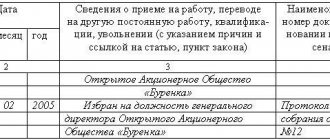“Personnel decide everything,” but for this they need to be selected wisely. In order to hire a suitable employee, it is necessary to carry out additional selection and, as a result, screening. The principle of freedom of employment contract gives the employer the right, and not the obligation, to conclude it with one or another applicant, forming personnel at its own discretion. Rejection of candidates is an integral part of this process.
- How to say “no” without conflicting with the law and avoiding charges of discrimination?
- What does an employer face for an unjustified refusal proven in court?
- What language should you avoid when writing a refusal notice?
These and other questions that arise when points of view on a vacancy do not coincide are discussed in this article.
Examples of job refusals:
- due to a criminal record - due to staff reduction - for business qualities - for health reasons - due to lack of registration - due to lack of experience - for a minor
The law protects, prohibits and obliges
Personnel formation is almost the only area of labor law where the employer feels more or less free and protected in relation to employees, or rather, to those who just want to become them. The Labor Code of the Russian Federation does not say anything that the employer is obliged to immediately fill any vacancies that appear or formalize labor relations with certain specific persons.
However, the Constitution and the Labor Code of Russia proclaim the principle of freedom of labor, which guarantees citizens the opportunity to unlimitedly choose the type of activity and use their ability to work (Articles 3-7 of the Constitution of the Russian Federation, Article 2 of the Labor Code). On March 17, 2004, the Supreme Court of the Russian Federation adopted a resolution on equal opportunities when registering labor relations. This right is duplicated in Art. 64 of the Labor Code, which directly prohibits discrimination in employment on any grounds other than professional ones and those specified in federal legislation.
REFERENCE! Provisions on discrimination in the world of work were regulated back in 1958 in Art. ILO Convention No. 111 and enshrined in Art. 19 of the Basic Law of the Russian Federation and Art. 3 Labor Code of the Russian Federation. When determining the professional and labor qualities of a candidate, employers are guided by the resolution of the Plenum of the Armed Forces of the Russian Federation dated March 17, 2004.
The latest legislative innovation is the norm of the labor law (Article 64 of the Labor Code of the Russian Federation), obliging the employer to explain the reason for the refusal to the applicant for a vacant position and, at the request of the latter, provide the refusal in writing within a week.
What consequences can there be for an employer if an unreasonable refusal to hire a person is made ?
Legal actions of the employer
Before refusing to hire an employee, it is necessary to ensure the legality of the motives that prompted the employer to make such a decision. In accordance with Art. 64 of the Labor Code of the Russian Federation, it is permissible to refuse employment on the following grounds:
- lack of necessary business qualities in the candidate}
- direct indication of the Law.
Refusal due to the employee’s business qualities
The Labor Code of the Russian Federation does not provide a specific definition of what exactly constitutes the business qualities of an applicant. However, the Plenum of the Armed Forces of the Russian Federation dated March 17, 2004 recommends that professional, qualification and personal qualities of a candidate, on the basis of which he can perform certain labor tasks, be considered businesslike.
For example, if during the trial it is established that the employer refused to hire in the absence of documents confirming the necessary qualifications of the employee, then this decision will be recognized as legal (clause 10 of the Plenum of the Armed Forces of the Russian Federation of March 17, 2004).
Cases of mandatory refusal
The legislation also provides for a number of other conditions, in the presence of which, the manager is obliged to refuse employment:
- the candidate has not reached the age specified in Art. 63 Labor Code of the Russian Federation}
- There are no documents provided in accordance with Art. 65 Labor Code of the Russian Federation}
- there is an entry in the work book about the deprivation of the right to hold certain positions or engage in certain activities}
- the candidate refuses to comply with the legal requirements of the employer provided for by labor legislation. For example, from undergoing a mandatory medical examination.
In addition to the above basic conditions provided for by labor legislation, there are a number of additional regulations that limit employment. For example, in accordance with Article 53 of the Law of the Russian Federation of July 10, 1992 No. 3266-1 “On Education,” it is prohibited to allow persons who have an outstanding or unexpunged criminal record to engage in teaching activities.
Legal grounds for refusing a job applicant
The reasons that any authority considers legitimate for refusal can only be related to the professional qualities of the candidate or to personal ones that may affect the quality of future activities. These are the reasons that should be indicated in a written notice of refusal, which will be considered justified.
IMPORTANT! It doesn’t matter what prompted the personnel officer to reject the candidate: lack of the required diploma, tattoo or too avant-garde hairstyle of the applicant, or a criminal record. The wording should not contain discriminatory statements, so only a justified reason should be voiced.
The following are recognized as legal grounds for refusing a candidate:
- Inconsistency of the applicant’s qualifications with the vacant position (confirmed by the absence of supporting documents, revealed at an interview or during the probationary period).
- Lack of knowledge, experience or skills necessary for future activities (confirmed by documents, recommendations, interviews, tests, tests, etc.)
- Unsuitable health status for this vacancy (confirmed by medical documents).
- Lack of suitable vacancies at the time of application (confirmed by the staffing table).
- Psychological inconsistency (confirmed by testing, interview, probation period).
- Age reasons determined by the Labor Code: some positions cannot be held by minors and persons who have crossed a certain threshold (Article 63 of the Labor Code).
- A court ban on holding certain positions.
- The candidate's reluctance to undergo a probationary period.
FOR YOUR INFORMATION! If a candidate was interviewed by a person not authorized to hire a person, then the positive outcome may be considered unlawful, and the refusal, on the contrary, may be justified.
Who should not be refused
If none of the above reasons are voiced, the refusal may be considered discriminatory and even challenged in court.
INFORMATION! If the court turns out to be on the side of the unfairly unemployed, the manager may face a fine of 30-50 thousand rubles, suspension of the enterprise’s activities for up to 3 months, and in cases of pregnant women and mothers, criminal liability.
Reasons for refusals that are illegal, which employers sometimes resort to, are listed below.
- Any characteristics not related to professionalism: skin color, nationality, political leanings, adherence to religion, etc.
- Lack of registration at the place of residence or place of work.
- Membership or lack thereof in a trade union organization.
- HIV-infected status.
Unconditional candidates
It is unlawful to refuse to hire certain categories of candidates:
- pregnant women and mothers;
- disabled people allocated to a position based on a quota;
- passed the competition;
- for those who are employed by transfer (within a month from the date of leaving their previous position).
In what cases is refusal to hire a person prohibited by law ?
Applicants' rights
In some cases, the employer is simply obliged to register the applicant for a job:
- If employment centers send an unemployed person to a place under a quota to fill a vacancy.
- In case of election by competition.
- With a positive court decision on reinstatement to work ( Article 16 of the Labor Code of the Russian Federation
).
The applicant has the right to demand a written explanation from the organization about the reasons for refusal to hire.
Correct refusal
IMPORTANT! Recommendations on the procedure for refusing to hire from ConsultantPlus are available here
It is always unpleasant for someone hoping to get a job to say, “You’re not right for us,” but it is often a necessary responsibility. Here are several ways to inform a candidate that his expectations were not met.
- Silence is a sign of refusal . A common way is to promise to call the applicant back after the interview if the decision is positive. The absence of such a call will automatically let the person know that he has not been accepted. If an unsuccessful applicant asks to state the reason for refusal, the employer should comply, but in practice this does not happen often.
- Legal notice by mail or electronically . When making such mailings, the employer needs to be very careful in formulating the reason for the refusal. Most often, the candidate is thanked for his attention to the organization, informed that someone else has filled the vacancy, and finally wishes for further success.
- Verbal "no" . The most unpleasant way for HR managers. A negative decision can be communicated in person or by telephone. Sometimes it is softened by a phrase about the possibility of employment in the future if circumstances change.
NOTE! It is not necessary to tell the applicant the true reason for the refusal. If it is not legally valid, and if you are required to formulate it in writing, you must try to justify the refusal with a legally permitted reason.
Templates for refusing an applicant
In view of the recent news that the Russian Government supported a bill obliging the employer to explain to the applicant in writing within a week the reason for refusing to hire (https://hr-tv.ru/hrnews/807.html), we have collected On the Internet, typical templates that potential employers send to applicants as a rejection text.
Some may be useful, others will make you smile.
So, let's go...
"Hello, …! Last week you were interviewed in a competition for a position... in our company. I would like to thank you for participating in the competition. You made a favorable impression, but we liked the other specialist a little more, and in the end we chose him. I wish you good luck in finding an interesting job!”
"Hello, …. Thank you for your interest in our vacancy. We have carefully reviewed your candidacy, but, unfortunately, we are not ready to make you a job offer. We may return to your resume if we need a candidate with similar professional experience, but for now we wish you to find an interesting job as soon as possible.”
“Thank you very much for your interest in our open vacancy “XXX”. Unfortunately, at the moment we are not ready to make you this offer. We have carefully reviewed your resume and may return to your candidacy when the need arises.”
“Thank you for your response. We have carefully reviewed your resume and are not yet ready to discuss this vacancy with you. We will definitely contact you as soon as we have a vacant position relevant to your professional experience."
“The competition for our vacancy is over for you!”
"Dear…! Your resume fully meets our requirements, but, unfortunately, the vacancy for which you applied in our organization has already been abolished (or “already taken”). We ask you to apologize for wasting your time. We wish you good luck in your further search.”
“Thank you very much for your interest in our vacancy. Unfortunately, at the moment we are not ready to make you an offer. We have carefully reviewed your candidacy and may consider it when the need arises. We hope that in the very near future you will be able to realize your potential at work in another
"Hello, …. Thank you for your interest in cooperation, but, unfortunately, we do not have any vacancies in our company that match your profile. We will keep your professional experience in mind if the need for such specialists arises. I wish you good luck in your job search!”
“Thank you for your interest in our vacancy “...”. We received a lot of interesting responses and the choice was not an easy task for us. Unfortunately, we are forced to reject your candidacy, because... We were lucky to find applicants who better meet our requirements. We hope that in the future you will have the desire and opportunity to submit your candidacy again if we have a vacancy that matches your experience and skills. Our mandatory requirement is... Perhaps our demand is too high, but, you see, we have the right to this. We wish you further professional improvement and good luck in all your endeavors!”
“We were pleased to meet you as a candidate for the vacancy “...”. We were deeply impressed by your ability to perfectly navigate complex professional problems, your education, excellent business qualities, as well as professional and personal maturity. Unfortunately, we chose a candidate whose work experience is more consistent with the tasks of our business. We wish you further professional improvement and good luck in all your endeavors!”
“The personnel department of OJSC XXX has reviewed your resume. Unfortunately, we cannot invite you, since the “YYY” vacancy is closed. We will include you in the database for possible cooperation in the future."
“Thank you for your interest in our company. Unfortunately, we do not have any open vacancies that match your qualifications and work experience. Your resume will be saved in the database and perhaps we will return to your candidacy when the need arises."
“Thank you for your interest in our company. We are interested in your resume, but, unfortunately, the rewards we offer are lower than what you stated. Today we can offer no more than 15,000 rubles/month"
“Dear...! During our meeting, I promised to contact you as soon as a final decision has been made regarding the vacant position of “...”. As you understand, this position requires a high level of qualifications and the presence of very specific personal qualities. For this reason, we considered a large number of applicants for this vacancy. I want you to know that you were among the three best candidates. However, after a detailed discussion with the management of the results of the competition, it was decided to offer this job to another candidate. Nevertheless, you showed your best side, and I received great pleasure from getting to know you. If you do not object, we will save your data and will notify you when vacancies arise that may be of interest to you. Thank you for your interest in our company. With best wishes, Head of Recruitment Department..."
"Good afternoon. Unfortunately, based on the results of the interview, we are not ready to offer you this position, having made a choice in favor of another candidate. On behalf of XXX, I express my gratitude for your interest in the vacancy and your time spent and wish you good luck in your future job search."
“Dear applicant! Our company is grateful for your interest. To our regret, your candidacy does not meet the requirements for the current vacancy. We will take your suggestion into account for the future. If there are suitable vacancies, we will offer you a vacant position. We will be very grateful if you receive your consent. Best regards, HR Manager"
How to write a written refusal to hire an employee
A document, the demand for which is recognized as imperative for the employer (Article 64 of the Labor Code of the Russian Federation), must be drawn up very carefully, since it can serve as evidence in legal disputes. When issuing a refusal of employment, make sure that it contains the following points:
- name and details of the organization (it can be issued on company letterhead);
- outgoing number (the document is registered);
- a clear formulation of the reasons for refusal of employment with legislative justification;
- visa of the manager or head of the human resources department, certified by the appropriate seal.
Refusal to hire due to criminal record
If an unsuccessful applicant asks the employer to state in writing the reason for the refusal, the latter is obliged to do so (Article 64 of the Labor Code of the Russian Federation). Notification must be provided in writing within 7 days of receipt of such request. An employer who fails to comply with this requirement on time may be held liable.
Such a document must be drawn up very carefully, as it may become the subject of legal proceedings.
A candidate's criminal record is not an absolute sign that can serve as a legitimate justification for refusal of employment. Only certain positions require its obligatory absence in the candidate’s biography: those related to financial responsibility, information technology, and, in certain positions, teaching activities, as well as service in internal affairs bodies. In all other situations, it will be legally unlawful to indicate a criminal record in the notification as a reason for refusal to hire.
ATTENTION! To notify, you need an official form of the organization or an indication of all its details. The refusal is recorded as outgoing documentation. As in any legally significant document, the manager’s handwritten signature, date and stamp, if applicable, are required.
LLC "Lingvogeniy" Ref. No. 12/156 dated September 18, 2017, P.I. Raskidaylov, Ekaterinburg, st. Academician Postovsky, 12, apt. 28
NOTICE Dear Peter Ivanovich!
Thank you for attending the interview at Lingvogeniy LLC on September 11, 2017. We regret to inform you that we are forced to deny you employment for the position of German language teacher in the middle age group at our training center.
According to the certificate provided, you have a criminal record under Art. 116 of the Criminal Code of the Russian Federation, which relates to the categories of crimes against life and health. Despite the fact that you were not convicted, the investigation was terminated on non-exonerating grounds. Labor Code of the Russian Federation in Art. 331 “The right to engage in teaching activities” prohibits persons with such a criminal record from being allowed to work with minor students.
General Director of Lingvogeniy LLC /Prokhorov/ V.V. Prokhorov
The refusal is unfounded, how to determine it
The request to conclude a labor contract has been rejected, and then the applicant wonders if there are grounds for this. Again, Article 64 of the Labor Code of the Russian Federation will come to the rescue.
Unfounded reasons are:
- Absence of an existing reason, the employer had to provide one.
- A person who came for an interview because of his gender was rejected, that is, he became a victim of discrimination.
- The refusal does not affect the business qualities of a potential candidate.
Every citizen has the right to appeal a refusal to hire, but it is better to use the services of a lawyer. Refusal to work should not confuse a person. If it has already happened, then it is better to take care of obtaining a written document of refusal, which should indicate all objective reasons. It will be difficult to defend your legal rights if there is no such “ace in the hole”.
IMPORTANT !!! Based on the above reasons, we can safely say that they may not be hired for just two reasons. The applicant lacks business qualities for work - this is the first. Failure of the applicant to fulfill the claims provided for by law is the second.
To better understand, it’s worth considering everything in a fictitious case: a builder, who is also an engineer by education, was denied admission to the workforce because of his education as an economist. Or, as an alternative, one example - a minor applicant was not hired for work because it was performed under conditions harmful to health. The situation is more complicated when a person is refused due to business qualities. In this matter, unfortunately, the current legislation has not provided any formal arguments to clearly explain this term.
Refusal to hire due to staff reduction
Reducing the number or staff of an enterprise is a rather sensitive procedure from a legal point of view. Some employees are fired, but there cannot be any talk of hiring other personnel for these positions, otherwise the reduction will be illegal.
However, it may well be that due to the “redrawing” of the staffing table, other positions appear, or during the reduction, certain vacancies open up, and candidates want to fill them.
IMPORTANT! Former company employees who are laid off due to staff reduction have priority in employment. First of all, new vacancies should be offered to them. Only if a written refusal has been received from them, recruitment for these positions can be announced among outsiders.
If a redundant employee refuses existing vacancies and is fired, and then wants to take one of the newly created vacancies, he will also have priority over other applicants. Although it is important to remember that the employer is not obliged to inform a previously dismissed employee about the vacancy.
In any case, staff reduction cannot in any way be considered an independent legitimate reason for refusing to conclude an employment contract.
Refusal to hire based on business qualities
Such a reason for refusal is certainly legitimate. The employer has every right not to hire an employee who does not meet the requirements for the position for which he is applying. If employers mask with this wording the true reason for their reluctance to enter into an employment relationship, which is not legal, the discrepancy with business qualities must be documented.
In accordance with the norms of business documentation, when registering a refusal, you must adhere to the following requirements:
- draw up a document on company letterhead or indicate the necessary details of the organization;
- register the outgoing document indicating the method of delivery to the addressee (in person against signature or by registered mail with notification);
- justify non-compliance with business qualities with the requirements of the job description or labor legislation;
- fix the document with the signature of the manager and the seal of the organization.
Below is an example of drawing up a justification for refusal of employment due to inadequacy of business qualities
LLC "Pishchepromavtomatika" Ref. No. 14/118n dated 06/08/2017 Petrikovskaya E.S., Samara, st. 1st Beloretskaya, 3, apt. 11.
Dear Elena Sergeevna!
In response to your request dated June 02, 2021, to justify the reason for refusal of employment in accordance with Part 5 of Art. 64 of the Labor Code of the Russian Federation we inform the following.
The director of Pishchepromavtomatika LLC, by order No. 14 dated June 15, 2015, approved the job description for the head of the marketing department, which requires a higher specialized education and fluency in English.
From the documents you provided at the interview, it is clear that you received a specialized secondary education with a degree in economics, and also completed non-specialized foreign language courses. During the interview, it was revealed that your level of English proficiency is lower than necessary for free communication. In addition, secondary specialized education is not enough to occupy this position.
Due to the non-compliance of your business qualities with the requirements stipulated in the job description, Pishchepromavtomatike LLC is forced to refuse to conclude an employment contract for you to occupy this position.
Part 6 art. 64 of the Labor Code of the Russian Federation allows you to appeal this refusal in court.
General Director of Pishchepromavtomatika LLC /Lisitsky/ S. N. Lisitsky
Refusal to hire for health reasons
Health status is an integral component of the business qualities of a job applicant. This is how it is interpreted by Resolution of the Plenum of the Supreme Court of the Russian Federation No. 2 of March 17, 2004. Not for all professions a medical examination during employment is mandatory, but for a number of positions and categories of employees it is mandatory. This applies to the types of labor listed in Art. 213 of the Labor Code of the Russian Federation (work in transport, in children's and educational institutions, catering, etc.), as well as for minors seeking employment. The employer must be convinced that by allowing the applicant to work, he will not harm either his health or the health of people who come into contact with him in the course of his work.
Art. 253 and 265 of the Labor Code of the Russian Federation substantiates the possible discrepancy between the physical or mental health of a candidate for a vacant position, and Art. 266 regulates the mandatory requirement of medical documents as part of the employment package.
When refusing due to non-compliance with health requirements, the employer must prove that they are presented specifically for the position for which the candidate wanted to apply, and are confirmed by legislative provisions, for example, a medical report.
Below is an example of a letter justifying the reasons for refusal of employment related to health conditions
LLC "Golden Key" Ref. 34/12 dated July 11, 2017 to A.L. Raynovsky, Moscow, Lyalin Lane, 8, apt. 10
On the reasons for refusal to conclude an employment contract Dear Anton Leonidovich!
In response to your written request dated 07/09/2017 to justify the reasons for refusal of employment for the position of pizza master at the Golden Key cafe, we inform you as follows.
Labor Code of the Russian Federation in Art. 213 requires a mandatory medical examination to work in public catering organizations. The requirements for the vacancy, posted in the media and on the Internet, indicated the requirement that the candidate have a certificate of completion of a medical examination in form 086-u. You did not provide this document during the interview.
In accordance with the requirements of Part 1 of Art. 213, the package of documents you submitted when applying for a job is incomplete. On this basis, we refuse to employ you.
According to Art. 64 of the Labor Code of the Russian Federation, you can appeal this refusal in court within 3 months.
General Director of Zolotoy Klyuchik LLC /Limonova/ L. D. Limonova
How to explain a refusal to hire and is it necessary?
Auditor CG “Ayudar” answers questions from I. E. Ivanova
Does the applicant have the right to demand from the employer (autonomous institution) an explanation of the reasons for refusing to conclude an employment contract with him? If yes, then in what form should the refusal be issued?
As you know, concluding an employment contract with a specific person is a right, not an obligation, of the employer. At the same time, it is prohibited to refuse to hire a person in the absence of objective reasons (Part 1 of Article 64 of the Labor Code of the Russian Federation). At the written request of a person who is denied an employment contract, the employer is obliged to provide the reason for the refusal in writing. This must be done no later than seven working days from the date of presentation of such a request.
In turn, the judges hold the following opinion on this issue: Art. 64 of the Labor Code of the Russian Federation does not allow the employer to hide the true reasons for refusing to conclude an employment contract (see Definition of the Constitutional Court of the Russian Federation dated March 23, 2010 No. 351-О-О).
For your information
Article 3 of the Labor Code of the Russian Federation states: no one can be limited in labor rights and freedoms or receive any advantages, regardless of gender, race, skin color, nationality, language, origin, property, family, social and official status, age, place of residence , attitude to religion, political beliefs, membership or non-belonging to public associations, as well as other circumstances not related to the employee’s business qualities.
Paragraph 10 of the Resolution of the Plenum of the Armed Forces of the Russian Federation dated March 17, 2004 No. 2[1] states that it is prohibited to refuse to conclude an employment contract for circumstances of a discriminatory nature, including women for reasons related to pregnancy or the presence of children (Part 2 and 3 Article 64 of the Labor Code of the Russian Federation), employees invited in writing to work by way of transfer from another employer, within one month from the date of dismissal from their previous place of work (Part 4 Article 64).
If the court finds that the employer refused to hire due to circumstances related to the employee’s business qualities, such refusal will be justified. Business qualities should be understood, in particular, as the ability of an individual to perform a certain job function, taking into account his existing professional qualifications (presence of a certain profession, specialty, qualification, etc.) and personal qualities (for example, state of health, presence of a certain level of education, experience in a given specialty, in a specific industry).
Therefore, an applicant can be refused on the following grounds:
- education does not meet the requirements;
- insufficient work experience;
- lack of necessary profession and qualifications;
- medical contraindications.
At the same time, the requirements for applicants must be defined in detail in the application for searching for a candidate for a vacant position, which is drawn up on the basis of the job description.
The text of the application must clearly indicate the requirements for education, work experience, and knowledge that the applicant for the vacant position must meet. Thus, the applicant has the legal right to contact the employer with a question on what basis he was refused to conclude an employment contract, and the employer, accordingly, has the obligation to notify the candidate for a vacancy in writing about the reason for the refusal.
note
If the employer received but ignored the written request of the applicant, he faces a fine under Art. 5.27 Code of Administrative Offenses of the Russian Federation : for officials - from 1,000 to 5,000 rubles, for legal entities - from 30,000 to 50,000 rubles.
The applicant can appeal the refusal to conclude an employment contract in court (Part 6 of Article 64 of the Labor Code of the Russian Federation). A failed employee has the right to claim restoration of violated rights, compensation for material damage and compensation for moral damage (Part 4 of Article 3 of the Labor Code of the Russian Federation).
In this regard, in order to protect itself from disputes with applicants, it is advisable for the employer to adhere to the following procedure :
- provide the applicant with a notice of refusal to conclude an employment contract, indicating the reason(s) for the refusal and issuing a notification on the official letterhead of the institution signed by the head of the administrative office (we emphasize that this must be done no later than seven working days from the date of receipt of the applicant’s request);
- register a notification in the outgoing correspondence journal, indicating the details of the letter, the method and date of its sending to the applicant;
- if the notification is sent in person, check that the candidate confirms receipt of the letter (for example, by signing and dated the institution’s copy). If it is not possible to deliver the notice in person, send it by mail with a list of the contents and a return receipt.
The standard form of refusal to hire is not provided for by the labor legislation of the Russian Federation, therefore the employer must develop it independently and approve it by the relevant local act signed by the head of the autonomous institution.
Is it a violation of labor law for an employer to refuse to hire because the applicant disagrees with the inclusion of a probationary period clause in the employment contract? In this case, can the employer ignore the applicant’s demand to explain the reasons for not concluding an employment contract?
An employment contract is an agreement between an employer and an employee (Article 56 of the Labor Code of the Russian Federation). Under the terms of Part 4 of Art. 57 of the Labor Code of the Russian Federation, such an agreement may provide for additional conditions that do not worsen the employee’s position, in particular the condition of probation. At the same time, Part 1 of Art. 70 of the Labor Code of the Russian Federation clarifies that the specified condition can be included in an employment contract only by agreement of the parties. This position is shared by Rostrud (see Letter dated May 17, 2011 No. 1329-6-1). Accordingly, if the applicant objects to undergoing the test, and the employer does not intend to exclude this condition from the employment contract (no agreement has been reached between the parties), the contract cannot be concluded.
For your information
Article 70 of the Labor Code of the Russian Federation provides for a circle of persons for whom a probationary period is not established. In particular, this includes pregnant women, persons under 18 years of age, employees invited to work as a transfer from another employer, young specialists entering work for the first time in their specialty, as well as other persons in cases provided for by the Labor Code of the Russian Federation, other federal laws, collective agreement.
Another important point is that when hiring for a period of up to two months, no test is imposed on employees (Article 289 of the Labor Code of the Russian Federation).
Thus, the norms of labor law allow that if the applicant refuses to include a probationary period condition in the employment contract, this contract may not be concluded, since an agreement between the employer and the individual has not been reached. Consequently, the employer’s actions do not lead to a violation of labor laws.
As for the second question (can an employer ignore the applicant’s request and not explain the reasons for not concluding an employment contract), in our opinion, this should not be done.
It is necessary to respond to this requirement within seven working days from the date of its presentation (Part 5 of Article 64 of the Labor Code of the Russian Federation). And be sure to indicate in it that the institution is ready to hire the applicant under certain conditions, including the condition of a probationary period. [1] “On the application by the courts of the Russian Federation of the Labor Code of the Russian Federation.”
Refusal to hire due to lack of registration
When forming staff, employers have the right to give preference to candidates of their choice. Often the decisive factor is the presence or absence of registration at a particular place of residence. However, this reason cannot be a basis for refusing to conclude an employment relationship. In Art. Part 2 Art. 64 of the Labor Code of the Russian Federation directly states that the presence or absence of registration at the place of residence or place of residence is not related to the business qualities of the candidate. Therefore, it is not considered as a factor that could affect employment.
Legally, such a refusal will be unlawful and discriminatory, which means that an unfairly offended applicant may well go to court to appeal it.
The person who is refused may well require written reasons for this, possibly to appeal in court. The employer has no more than 1 week for this. Delay is also fraught with liability.
Even if the reason why the applicant was rejected is truly related to his registration or lack thereof, the employer should not formulate it in exactly this way. The law does not allow discriminatory grounds for refusing potential employees, therefore an employer who writes this reason in the notice of refusal is thereby violating labor laws.
The law does not require hiring
There are cases when employment is guaranteed by law and the employer cannot refuse to hire an applicant or to conclude an employment contract. Such situations include:
- an invitation by way of transfer from another employer (Part 4 of Article 64 of the Labor Code of the Russian Federation);
- assignment to work against the established quota of jobs (Article 13 of the Law of April 19, 1991 No. 1032-1 “On Employment in the Russian Federation”);
- election to a position (Articles 16, 17 of the Labor Code of the Russian Federation);
- election by competition to fill the corresponding position (Articles 16, 18, 332 of the Labor Code of the Russian Federation).
Here, the employer's discretion regarding the choice of candidate is limited. No arguments can justify the refusal. If the employer refuses to conclude an employment contract for the applicant, the applicant has the right to demand compensation for lost earnings.
Article 234 of the Labor Code obliges the employer to compensate the employee for the earnings he did not receive in all cases of illegal deprivation of his opportunity to work. The list given in it is not closed. Violation by the employer of the legal ban on refusal of employment, we believe, can be considered as an illegal deprivation of the employee’s opportunity to work.
If the applicant does not belong to one of the categories that are provided with an additional guarantee in the form of a ban on refusal of employment, then in the event of an illegal refusal to hire, he can only count on compensation for moral damage. The court does not have the right to force the employer to conclude an employment contract with everyone. Considering, however, that companies have to refuse employment quite often, declaring such refusals illegal will entail serious financial consequences for the employer.
If it is proven that the actions or inaction of the employer do not comply with the law and violate the rights of the employee, the infliction of moral harm to the latter by such actions (inaction) is presumed (clause 63 of Resolution of the Plenum of the Armed Forces of the Russian Federation dated March 17, 2004 No. 2; hereinafter referred to as Resolution No. 2). The court can only determine the amount of compensation for moral damage (Part 2 of Article 237 of the Labor Code of the Russian Federation). Even failure to inform the employee, at his request, of the reasons for the refusal in writing allows him to file a lawsuit to recover compensation for moral damage from the employer, including when the refusal is considered justified. Therefore, the employer must approach the issue of justifying and formalizing the refusal to conclude an employment contract with all responsibility.
Refusal to hire due to lack of experience
Work experience is part of the business qualities and personal qualities of the future employee (clause 10 of the Resolution of the Plenum of the Supreme Court of the Russian Federation No. 2 of March 17, 2004). When announcing a vacancy, the employer indicates the requirements for the position based on labor legislation or internal regulations that do not contradict it (for example, an order approving a job description). Some positions require a certain number of years of service by the candidate in similar or less responsible positions.
The length of service of a potential employee is reflected in his work book, which must be provided as part of the package of documents upon employment. The person doing the hiring can easily verify whether the work experience corresponds to what is required to fill a particular vacancy.
If the candidate has the necessary work experience and indicated this in the resume, and at the interview it turns out that this experience is not confirmed by entries in the work book, the refusal will be completely justified.
LLC "Derevo-Style" Ref. No. 16 dated April 6, 2021 in response to the statement dated March 30, 2021 N.A. Lesnikov, Voronezh, st. Apricotovaya, 67, apt. 14
NOTICE Dear Nikolai Andreevich!
In response to your written request on March 30, 2021 with a request to justify the reasons for refusal to hire, in accordance with Part 5 of Art. 64 of the Labor Code of the Russian Federation we inform you the following.
You were denied an employment contract with Derevo-Stil LLC due to your lack of the required work experience as provided for in the current job description of a carpenter-machine operator at Derevo-Stil LLC. This instruction No. 18 was approved by the director of Derevo-Stil LLC on May 14, 2015. Clause 2.2 of the job description states that to occupy the position of a carpenter-machine operator, you must have secondary specialized education in this profile and at least a year of work experience in a similar position. The data from the work book you provided indicates that you have not held similar positions since you are employed for the first time.
Based on the above, your business and personal qualities do not meet the requirements for the vacancy of a joiner-machine operator at Derevo-Stil LLC. The conclusion of an employment contract is impossible according to Part 2 of Art. 64 Labor Code of the Russian Federation.
General Director of Derevo-Style LLC /Safyanov/ O.L. Safyanov
Prohibition of unlawful refusal of employment
Article 64 of the Labor Code
provides applicants with certain guarantees and prohibits the employer from unreasonably refusing to conclude an employment contract.
Only the business qualities of a candidate are the object of study by HR managers when choosing an employee.
Gender, age, nationality, social status, property status have no effect.
Job portals often contain advertisements of this nature:
A woman under 30 years old with attractive appearance is required to work as a secretary.
The following lists the professional qualities required of a candidate for the position. This is all clear.
A secretary must have certain skills in order to immediately perform her duties efficiently.
But how will a person’s external data affect his work?
What if the candidate is 32 years old? Will he be worse at answering calls than a 29-year-old job seeker, or will he make coffee the wrong way?
Such advertisements have been illegal since 2013. The employee must be genderless and ageless.
Candidates cannot be selected based on their place of residence or marital status.
Over the past two years, litigation has arisen over discriminatory claims.
Often, based on complaints from applicants, the activities of organizations that submitted incorrect advertisements were checked, and the latter had to pay fines.
Let's consider the main features of the prohibitions that are enshrined in the labor code:
- Women cannot be denied employment because they are pregnant or have children. But at the same time, the applicant will have to find evidence that the potential employer knew about the woman’s special marital status. And the reason for the refusal lies not in business qualities, but in the presence of children or pregnancy.
- You cannot refuse an applicant invited in writing from another employer if he came to apply within one month after dismissal from his previous place.
Peculiarities of registration of refusal for candidates invited by transfer
Persons invited to work from another organization must be registered without fail. But there is one thing.
There is a statute of limitations on the invitation, after which all obligations of the employer towards the potential employee cease.
A person is given one month after dismissal to begin working in the organization that invited him.
After the deadline has expired, the employer has every right to refuse the candidate.
Even a valid reason is not a reason to increase the term.
Now hiring is not an obligation, but the right of the inviting party.
Let's look at an example:
Ivanova G.N. resigned on February 15 from Caspiy LLC at the invitation of Individual Entrepreneur Chebotarov.
It was agreed in advance that the woman would start working on February 20.
But Ivanova did not come to the personnel department at the appointed time, and she did not appear in the following days.
Only on March 25, an applicant appeared on the doorstep of the company demanding to hire her.
She explained her non-appearance with good reasons (her son’s illness).
Although the employer wanted to put herself in Galina’s position, he could not hire her.
The vacant position was already filled by another candidate.
In this situation, the employer’s actions are legal.
He waited until the invitation expired and only then accepted the employee instead of Ivanova.
Despite good reasons, the woman herself is to blame for being left without work.









